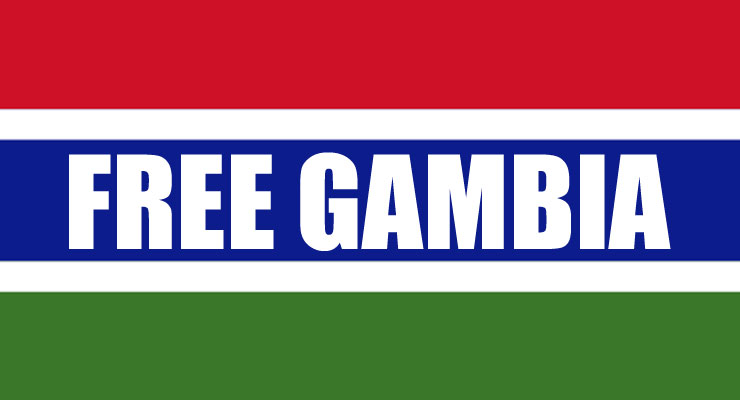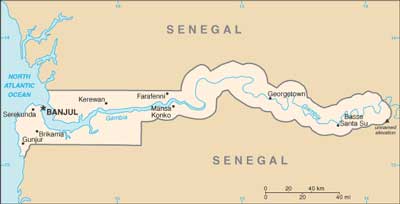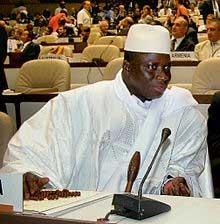
Are Yahya Jammeh’s obnoxious mind games creating deadlock?
The Gambia is an African State situated on the Atlantic coast in westernmost Africa and surrounded on three sides by Senegal. It is often described as “the tongue in Senegal’s mouth”.
The Gambia gained independence from Britain on 18 February 1965. Dawda Jawara was Prime Minister until 1970 when he became President. In 1981 Jawara succeeded to quell a military coup d’état with the aid of the Senegalese army. This led to the creation of the Confederation of Senegambia that lasted until 1989. Jawara was later toppled by a coup in 1994 organized by junior military officers over unpaid wages. Lieutenant Yahya Jammeh became Chairman of the Armed Forces Provisional Ruling Council (AFPRC). He stood for elections in 1996 on his newly created Alliance for Patriotic Reorientation and Construction (APRC) ticket and defeated two other candidates due to the favorable conditions the junta had created for him by placing a ban on the three political parties active during the Jawara years and on anyone who had held a ministerial post since independence. Since 1996 Jammeh has “won” elections 3 consecutive times in 2001, 2006 and 2011 but was finally defeated in 2016.

Elections were held on 01 December 2016 in the Gambia. In a political rally on 11 December 2015 Yahya Jammeh had renamed The Gambia as “The Islamic Republic of the Gambia”. “In a surprise result, opposition candidate Adama Barrow defeated… Yahya Jammeh.”[i] Alieu Momar Njie, the President of the Independent Electoral Commission (IEC) announced on 02 December 2016 that Barrow of the United Democratic Party (UDP) won with 45.5 percent for his Independent Coalition of Parties (ICP) as against 36.7 per cent for Jammeh and 17.8 per cent for Mama Kandeh of the Gambia Democratic Congress (GDC).[ii]
It was too good to be true to see Yahya Jammeh concede defeat on television that same day. Too good to be true because a week later, on 09 December 2016, Jammeh reappeared on television announcing his “…total rejection of the election results…”[iii] and that he had annulled the elections in its entirety. He continued that Gambians will go back to the polls because he wanted to make sure that “…every Gambian has voted under an Independent Electoral Commission that is independent, neutral and free from foreign influence.”[iv]
From every indication, what made Jammeh to reject the elections entirely was a new set of results issued by the IEC on 05 December 2016 as a correction of the initial results. These new results now gave Barrow 43.29 per cent of the votes in the presidential election, while Jammeh took 39.64 per cent, thus showing a slimmer-than-thought victory for Barrow, of just over 19,000 votes. The turnout was 59%.[v] Despite this alibi, many have described Jammeh’s decision to ‘annul’ the elections as a sudden twist or spectacular turn of events, a blow, or still, a big surprise.[vi] However, is Jammeh’s decision to contest the election results really that surprising? How can we understand his decision and what is the way forward?

Gambia is on the list of Africa’s 24 dictatorships.[vii] It is established that African dictators generally intend to die in power and will do everything possible to stay in office including rigging elections. Therefore, they generally do not organize elections to lose them since they are referee and player at the same time in electoral processes. However, in some instances, elections have turned out against the incumbent dictator and as can be expected most of these dictators did not accept the results and attempted to stay in office. One of the most widely studied cases was the November 2010 electoral deadlock in the Ivory Coast.
The typical African dictator does not play by the rules of democracy. They operate neo-patrimonial systems of government that make their countries purely nominal democracies. Elections in these countries are simply smoke screens meant to bestow some amount of legitimacy on the dictator but mostly to satisfy international organizations and Western nations. These dictators are generally “voted” in elections that are largely boycotted by a largely apathetic electorate. They therefore have no legitimacy and their legality in office is also questionable and therefore merely a matter of uneasy accommodation. While Yahya Jammeh fits this picture, his case is peculiar as he first accepted the results then rejected them later as against most African dictators who will simply just reject any results that show they have been defeated.
However, the controversy of the changes in election results is a too easy to go by explanation for Jammeh’s decision/behaviour especially in the light of some specific aspect of his style of government. In effect, it is highly probable that elections have become the new terrain for Jammeh’s usual obnoxious mind games, thus taking his dictatorship one step further.
Yahya Jammeh seems to have transformed Gambia into his private hide and seek playground and has made Gambians his playmates despite them. Whether or not Njie was part of this game, what is clear is that Jammeh’s megalomania is very disturbing when one considers the fact that he might actually have moved into the realm of elections with his hide and seek politics. Past events have shown that Jammeh is used to raising, then dropping the expectations of Gambians or the other way round, as well as stretching-and-releasing their fears or still, doing it the other way round. This attitude of his must be taken very seriously when looking at his behavior in the present situation. Treating Gambians like this should warrant the interest of the International Criminal Court (ICC) in prosecuting this dictator. It should also invite international sanctions against him and why not an intervention to remove him from power as was the case with Gbagbo in the Ivory Coast in 2010.
“[Jammeh] manipulates the population, including civil servants and regime supporters, with hoax coup attempts that are foiled at the eleventh hour, only to be followed by yet another wave of arrests, firings, and detentions at Mile II, the country’s notorious prison. There is impunity for the National Intelligence Agency (NIA) and the agency can, according to the 1995 decree, search, arrest, or seize any person or property without a warrant in the name of State security. In 2011, individuals continued to be arrested without warrants and held incommunicado. Torture of prisoners, including political prisoners, has been reported. Jammeh practices ethnic politics, giving preferential treatment to the Jola in the military and Government.”[viii] With this state of affairs, the 2011 Presidential election was marred by voter intimidation and Government control of the media. Such violence was perpetrated by the supporters of Jammeh so as to ensure victory for him.
On 30 December 2014 there was yet another hoax coup d’état that was foiled as usual. Many feared this to be a strategy by Jammeh to create a tense security situation in the country that will serve to justify any restrictive measures he would take in 2016 elections so as to limit the campaigning of his opponents.
“…[Jammeh desires] to remain in power at any cost…[He] has orchestrated a state of siege to hold an entire population hostage, psychologically stressed and paralyzed by fear. His objective is to keep everyone guessing. While…[many] go hungry, Jammeh revels in occasional acts of piety and magnanimity, but punishes with a vengeance those who dare cross him. The result is political instability, personal and professional insecurity and paranoia driven by Jammeh’s own insecurities, and fear of being overthrown and possibly killed. Therefore, there is logic to the corrosive stress that dwells in the hearts of most Gambians.”[ix]
It is this manner of governing that we have termed “obnoxious mind games.” While we do not know if Njie might be party to such games, it is highly likely that the so called spectacular turn of events seen in Jammeh’s refusal of the 2016 elections results after prior acceptance is not that surprising in the light of his affinity for unhealthy manipulation. The general tendency would have been for Jammeh, as an African dictator, to out rightly contest the results. Under such a scenario, Njie’s credibility might not be questioned or his role in Jammeh’s game would be imperceptible even if he was indeed part of its organization.
On the other hand, Njie who has been viewed as a very credible individual might still have participated in Jammeh’s game despite him. However, from the twist of events he might have done so voluntarily considering that heads of electoral commissions are generally loyal to the incumbent in African dictatorships.
Therefore, while the results showing Jammeh’s defeat have a very high probability of being correct since African dictators are unpopular and can rarely win any transparent elections, Njie might simply have been part of the game as seen in what is clearly an unacceptable counting error. It is certain that Jammeh lost the elections but only the king of the naïve would think that a counting error would not serve as an alibi for a dictator to contest the results of an election in which he lost. As such, how could Njie have made such a counting mistake in a dictator’s playground? Even if Njie is innocent, the stakes of making such a mistake in an election involving a ruthless dictator makes him “an intellectual accomplice” of Jammeh’s.
Jammeh’s manner of asking for redress makes this theory of his obnoxious mind games very plausible. One cannot help but notice that Jammeh could not hold himself back from saying that he was ‘annulling’ the results and that he was forbidding all street protests against his decision. Only the ruler of a quasi military dictatorship[x] can make such statements during an election in which he is a candidate like any other candidate. With full knowledge that he operates a regime with unlimited government, he proclaimed that he had annulled the results, a prerogative that is not his in electoral matters, thereby coming out clearly as player and referee at the same time and almost certainly revealing his game.
Accepting the results was the first step in making people excited and then later on creating a recount story was the second step in the game to exasperate minds and hopefully make them surrender and unwilling to participate in another poll after an election in which the strategy of a coalition had beaten Jammeh’s repressive measures and foul play of causing black-outs and cutting the country’s internet connection during the election. Jammeh has ordered the Police to ransack the IEC and has sent signals of his intent to change the IEC management.
Gambia’s Supreme Court is currently not operational with only one sitting judge, after Jammeh fired two others earlier this year.[xi] It is therefore likely that the next handpicked judges by Jammeh will favor his order of annulment. Under such circumstances, and with the Bar Association on strike in protest of Jammeh’s move to ‘annul’ the elections,[xii] it will be no surprise if Jammeh wins with a comfortable majority of votes cast in a fresh election that will now be characterized by voter apathy and voter intimidation by security forces. Barrow who answered Jammeh’s congratulatory call on the 02 December 2016 might therefore have been a pawn in Jammeh’s game.
Even though this theoretical development remains at the level of postulates, such postulates can be held true in the light of the trends in Jammeh’s dictatorship style linked to his affinity for playing the above mentioned obnoxious games. This perspective of Gambia’s deadlock, though difficult to investigate, must therefore not be overlooked. Jammeh is probably one of the few remaining mad men of Africa in the likes of Mobutu of Zaire, (today’s Democratic Republic of the Congo, DRC), and Idi Amin Dada of Uganda. Knowing this dictator’s mindset and style of government makes his one man show of accepting results today then refusing them tomorrow unsurprising. It is highly retaken in political science that dictators are psychopaths who will develop every possible scheme to stay in power including, as in the case with Jammeh, torturing a whole country psychologically. Jammeh is living proof that the Africa’s problems are endogenous, specifically her leadership, not exogenous.
Like Thomas Jefferson put it, “when injustice becomes law, resistance becomes a duty”. Unfortunately, at the moment, most of sub-Saharan Africa is highly impoverished, combined with societal fragmentation. Under such circumstances citizenry coordination to eliminate dictators like Jammeh is rare and sporadic especially when faced with the dictator’s bullets. Even the rise in populism does not help matters. Also, Martin Luther King Junior had stipulated that evil thrives because of the silence of the good.
There are real democrats in Africa. However, these good men have rarely constituted themselves to fight dictatorships on a continental scale. Even the African Union (AU) is not credible in promoting democracy on the continent as it is attended by 24 dictators and several other bad leaders from only partly free countries. It is said that birds of a feather flock together. Therefore, how would these dictators try removing a speckle of dust from Jammeh’s eyes by asking him, even if through the framework of the AU or any other regional integration framework, to step down while they carry the sand of their own dictatorships in their own eyes?
The African story is a sad one. A billion Africans are trapped in the hands of a few mad men who have taken the continent hostage. A good example is Yahya Jammeh of the Gambia who manipulates and exacerbates Gambians as he desires. Despite slavery and colonization, African leaders have done more to harm their fellow Africans than the West or the Arabs. Instead, the West has contributed in several respects and enormously so to uplift Africans.
As such, the solution to liberating Africans in general and Gambians in particular may not lie in the hands of Africans but in the hands of the West and the United Nations (UN). An international intervention to eject Jammeh from power and place Barrow in power is legitimate as was done in Cote d’Ivoire, a case that was even a controversial situation. The international community has the duty and obligation to end slavery in all its variants, including black on black slavery. Therefore, the international community must be unwavering in asking Jammeh to step down or otherwise face embargos and an ICC case.
The way forward in the long term is to draft a universal pact of democracy that truly liberates the Electoral Administration (EA) from the hands of dictators in Africa. The contours of such a framework can be characterized by transforming the EA into the fourth arm of government completely independent of the other three. UN membership, aid and cooperation must be conditional upon the respect of this international pact. Also, there must be unanimity in condemning aid from the Arab world to such dictators like Jammeh. There is no other explanation to Jammeh’s decreed Islamic Republic of the Gambia other than his desire to seek funds from the Middle East after his demise with the West and other African allies. Such funds will be taken in the name of Gambians but used to buy weapons to kill Gambians. The UN must not sit down passively and watch this type of attitude continue in The Gambia and elsewhere in Africa. By remaining passive, the UN is tacitly endorsing black on black slavery.
Sources:
[i] “Gambia’s Jammeh loses presidential election to Adama Barrow in shock election result”. BBC News. 2 December 2016. Retrieved 5 December 2016.
[ii] Ibidem
[iii] Park, M., (2016) “Gambian President Yahya Jammeh rejects election defeat”. CCN News, 10 December 2016. Retrieved 17 December 2016.
[iv] Ibidem.
[v] Straitstimes, (2016), “Gambian election row triggers calls for calm” consulted from <https://goo.gl/qunzl2> on 17 December 2016
[vi] Barry, J. Y, 2016 in https://goo.gl/iP7UAb; https://goo.gl/aTG3oS.
[vii] “Current World Dictators”. Planet Rulers, in <https://goo.gl/13W4RT> page visited on 15 December 2016.
[viii] End blasphemy laws, ‘Gambia’, in End blasphemy laws, n/a, accessed on 11 December 2015, <https://goo.gl/wXYDdS>
[ix] Saine, A., (n.d), “The Gambia’s deepening governance and economic crises: 1994-2015”, Book Chapter, in n.a, consulted from <https://goo.gl/HpT17E>, on 14 December 2016., p.264
[x] Ibidem, p. 262.
[xi] Vanguard, “Gambia in fear after Jammeh officially challenges election result” 14 December 2016, 6:41PM, retrieved from <https://goo.gl/mGNwcc> on 16 December 2016.
[xii] Ibidem.
Leave a Reply